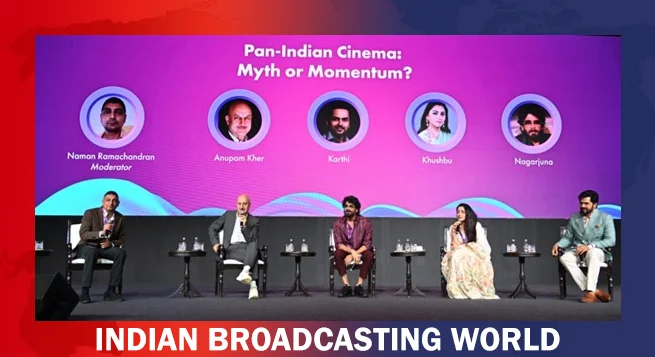NDTV organized a groundbreaking conclave, ‘Mahakumbh ka Arthashastra’, focusing on the vast economic, social, and environmental impact of the Mahakumbh, the world’s largest confluence of pilgrimage. The event highlighted the transformative role of this cultural phenomenon in shaping local and national economies while preserving India’s rich heritage.
According to a press release, the conclave brought together an impressive array of leaders, including Asim Arun, Minister of State (Independent Charge) for Social Welfare and SC/ST Welfare, Uttar Pradesh; Mangal Prabhat Lodha, Minister of Skill Development and Entrepreneurship, Maharashtra; Neelkanth Mishra, Chief Economist, Axis Bank; Awanish Kumar Awasthi, Advisor to the Uttar Pradesh Chief Minister; filmmaker Tigmanshu Dhulia; and lyricist Manoj Muntashir.
Mangal Prabhat Lodha emphasized Prime Minister Narendra Modi’s holistic vision of integrating heritage with economic development, stating, “PM Modi envisions a balance where religion and economic growth coexist. The Mahakumbh is not just a spiritual event but a catalyst for employment and national development.”
Echoing this sentiment, Asim Arun remarked, “Kumbh is an opportunity for economic brainstorming,” highlighting its potential to fuel discussions on sustainable growth and resource allocation.
Awanish Kumar Awasthi discussed efforts to modernize the Mahakumbh through digital innovations. “The transformation into a Digital Kumbh incorporates AI and chatbots, ensuring seamless experiences for millions of pilgrims while enhancing global branding,” he noted.
Neelkanth Mishra shed light on the role of digital payments, particularly for daily wage workers involved in the event. “Digital payments ensure ease, convenience, and security, empowering even the most marginalized participants,” he explained.
Shobhit Kumar Mishra, leading the Prayagraj Project under the Clean Ganga Mission framework, highlighted environmental advancements: “326 million liters of water are being treated, and 90% of drain water has been stopped from flowing into the Ganga, marking a significant ecological achievement.”
Swami Vishal Anand of Divya Jyoti Jagrati Sanstha underscored the Mahakumbh’s influence on tourism and employment. “13,000 new trains run across the country for this 45-day program. The event sparks development that continues well beyond its conclusion,” he shared.
By integrating cultural preservation with economic progress, ‘Mahakumbh ka Arthashastra’ showcased how the Mahakumbh acts as a powerful engine for infrastructure growth, employment generation, and ecological sustainability.
Through diverse perspectives from government, industry, and cultural leaders, the conclave reinforced the Mahakumbh’s role as a bridge between India’s ancient traditions and modern aspirations, offering valuable insights into its enduring legacy.
The event concluded with a shared commitment to leveraging the Mahakumbh’s global significance as a tool for holistic development, proving once again that faith, economy, and environment can thrive in harmony.
 Pay TV leaders chart course for India’s linear TV in digital age
Pay TV leaders chart course for India’s linear TV in digital age  WAVES 2025: Media dialogue backs creativity, heritage & ethics in AI Era
WAVES 2025: Media dialogue backs creativity, heritage & ethics in AI Era  Sudhir Chaudhary announces new show for DD News, says “Good content still has a place” at WAVES 2025
Sudhir Chaudhary announces new show for DD News, says “Good content still has a place” at WAVES 2025  India can lead global entertainment revolution: Mukesh Ambani
India can lead global entertainment revolution: Mukesh Ambani  TRAI chief not in favour of separate rules for OTT, legacy b’casters
TRAI chief not in favour of separate rules for OTT, legacy b’casters  Stakeholder alignment media’s big media challenge: BARC Chairman
Stakeholder alignment media’s big media challenge: BARC Chairman  Language no bar; stars say Indian cinema is united by emotion, culture
Language no bar; stars say Indian cinema is united by emotion, culture  Spielberg recognised me from ‘3 Idiots’, says Kareena at WAVES 2025
Spielberg recognised me from ‘3 Idiots’, says Kareena at WAVES 2025  Digital Radio is the future, but analog must co-exist says at WAVES 2025
Digital Radio is the future, but analog must co-exist says at WAVES 2025 










